- Home
- Marcia Talley
All Things Undying
All Things Undying Read online
Recent Titles by Marcia Talley
The Hannah Ives Mysteries Series
SING IT TO HER BONES
UNBREATHED MEMORIES
OCCASION OF REVENGE
IN DEATH’S SHADOW
THIS ENEMY TOWN
THROUGH THE DARKNESS
DEAD MAN DANCING *
WITHOUT A GRAVE *
ALL THINGS UNDYING *
* available from Severn House
This eBook is copyright material and must not be copied, reproduced, transferred, distributed, leased, licensed or publicly performed or used in any way except as specifically permitted in writing by the publishers, as allowed under the terms and conditions under which it was purchased or as strictly permitted by applicable copyright law. Any unauthorised distribution or use of this text may be a direct infringement of the author’s and publisher’s rights and those responsible may be liable in law accordingly.
This first world edition published 2010
in Great Britain and in the USA by
SEVERN HOUSE PUBLISHERS LTD of
9–15 High Street, Sutton, Surrey, England, SM1 1DF.
Copyright © 2010 by Marcia Talley.
All rights reserved.
The moral right of the author has been asserted.
British Library Cataloguing in Publication Data
Talley, Marcia Dutton, 1943–
All Things Undying. – (The Hannah Ives mysteries series)
1. Ives, Hannah (Fictitious character) – Fiction. 2. Women
mediums – Crimes against – Fiction. 3. Detective and
mystery stories.
I. Title II. Series
813.6-dc22
ISBN-13: 978-1-78010-048-7 (ePub)
ISBN-13: 978-0-7278-6879-4 (cased)
ISBN-13: 978-1-84751-263-5 (trade paper)
Except where actual historical events and characters are being described for the storyline of this novel, all situations in this publication are fictitious and any resemblance to living persons is purely coincidental.
In memory of the 946 American servicemen who died off the coast of Devon in April 1944 during Operation Tiger.
‘That Others May Live’
ACKNOWLEDGEMENTS
Thanks to:
Charles and Marilyn Mylander, who shared tales of Charles’s time as a faculty exchange professor at Britannia Royal Naval College in Dartmouth (as well as a huge box of memorabilia!), and especially for introducing me to:
Jill and Ian Rowe, David and Maralyn Norman and Richard and Anna Alexander, who adopted me when I came to Dartmouth and made sure I lacked for nothing. Chauffeurs, tour guides, lunch, tea and dinnertime companions extraordinaire. Come to Annapolis! Mi casa es su casa.
MaryLou Symonds, who graciously loaned me a copy of her unpublished journal, Brilliant! Adventures of an Academic Wife Abroad, which is . . . well, brilliant!
Dr Richard Porter, Curator of Britannia Royal Naval College, who took me on a behind-the-scenes tour of the college and supplied me with guidebooks, photographs and a pair of cufflinks, too.
Robbie Robinson, Curator at the Brixham Battery Heritage Centre, Devon, who told me the ‘real’ story of Slapton Sands.
Jean Parnell of Strete whose girlhood memories of the Evacuation of South Hams in November and December of 1943 remain vivid, and whose book, The Land We Left Behind, published in association with The Blackawton and Strete History Group (BASH) was an invaluable resource.
Sarah Glass, who was there from the beginning, when Susan Parker was born.
Brent Morris for Paul’s book; Eileen Roberts for Samantha and Victoria’s story; and Dot Lumley, for a blustery but delightful afternoon at Greenway House.
Kate Charles, the best of friends, who held my hand throughout, and helped keep my Brits from sounding too much like Americans.
The Annapolis Writers Group – Ray Flynt, Lynda Hill, Mary Ellen Hughes, Debbi Mack, Sherriel Mattingly and Bonnie Settle – for tough love.
That said, all mistakes are mine alone.
Dear! of all happy in the hour, most blest
He who has found our hid security,
Assured in the dark tides of the world that rest,
And heard our word, ‘Who is so safe as we?’
We have found safety with all things undying,
The winds, and morning, tears of men and mirth,
The deep night, and birds singing, and clouds flying,
And sleep, and freedom, and the autumnal earth.
We have built a house that is not for Time’s throwing.
We have gained a peace unshaken by pain for ever.
War knows no power. Safe shall be my going,
Secretly armed against all death’s endeavour;
Safe though all safety’s lost; safe where men fall;
And if these poor limbs die, safest of all.
Rupert Brooke, 1914: Safety
ONE
‘One of the longest standing and best known galleries in Dartmouth is the Simon Drew gallery in Foss Street. Famous for his fantastic combination of humour and design it is almost impossible to visit the gallery without being tempted into buying a gift for someone (or maybe even yourself!)’
Nigel Evans, Reflections of Dartmouth, Richard Webb, 2008, p.29
When it’s late July and so hot you could fry an egg on the sidewalk, I find it hard to look seriously at fall fashions in shop windows.
Except I was in Dartmouth, Devon, UK, and the only fried egg I was likely to see that day had been at breakfast at our B&B at the top of Horn Hill.
‘You’d look good in that, Hannah,’ Alison said, nudging me with her elbow.
‘That’ was a knee-length, nubby-knit sweater coat in tweedy, earth-tone, crock pot colors that had been all the rage back in the 1960s. We were vacationing in Devon, and I’d forgotten to pack the brown leather belt that I liked to wear with my favorite pair of jeans, so Alison and I had poked our noses into every boutique and charity shop along Duke Street looking for a replacement.
‘You can wear orange,’ I said, considering my friend’s neatly bobbed, fashionably fringed, coppery-blond hair and green eyes. ‘Me, I look like the Great Pumpkin in orange.’
Alison seized my upper arms with both hands and spun me around gently until I was standing with my back to the window. She squinted at me in the mid-afternoon sunlight, then stared into the window, sizing me up against the coat. ‘You’re right,’ she agreed, dropping her hands to her sides. ‘I’m remembering you from before, back when you had dark hair and pale English skin.’
I turned to study my reflection in the glass. ‘This tan will fade soon enough,’ I said. ‘I slathered myself with SPF thirty-five in the islands, wore hats, but . . .’ I shrugged. ‘The price one pays for six months in the Bahamas.’
Alison grinned. ‘Poor you.’
‘Tragic,’ I agreed.
‘As for the hair,’ I continued, combing through the curls with my fingers, fluffing them out, ‘I was getting panicky about the gray. Before we left Annapolis, I let my hairdresser talk me into highlights.’
‘Goes with the tan,’ Alison said. ‘I like it.’
‘Me, too,’ I confessed. ‘Until my pale English skin returns and I get roots.’
‘We do have hairdressers in England, you know. Remember Beautopia?’ she said, naming a hole-in-the-wall salon where we once had our faces done on a particularly fine Girls’ Day Out.
‘Eeek! How you talked me into that eye shadow, I’ll never know. Acid Rain?’ I said, remembering a particularly vile shade of yellow sold by an upstart cosmetic company called Urban Decay.
‘You made me buy the roach-colored lip gloss, as I recall, so nobody’s vying for sainthood here.’ Alison punched me lightly on the arm
. ‘We had fun, didn’t we, Hannah? I’m already missing you, and you’ve only just arrived. Three weeks isn’t much of a holiday, if you ask me.’ She looped an arm through mine. ‘Jon and I haven’t seen you in ten years. I wish you could stay longer.’
We turned right and strolled down the center of Foss Street, an ancient thoroughfare that had been neatly cobblestoned and pedestrianized. Upscale galleries, shops and restaurants stood cheek by jowl on both sides of the narrow lane. ‘Alas, Paul has to teach,’ I said, stopping for a moment at the corner of Flavel to admire a watercolor in the window of Baxter’s Gallery. ‘Classes begin again on August twenty-fourth.’
‘Rotten luck. You’re going to miss Regatta, and the fireworks, and the Red Arrows!’
‘And the beer barrel roll, and the trolley race. I know.’
The Royal Regatta, an extravagant three-day city fair, featured sailboat and rowing races, too. Regatta had been a highlight of the year we spent in Dartmouth over a decade ago, when Paul had participated in the faculty exchange program between the United States Naval Academy and Britannia Royal Naval College. Sadly, the program had been discontinued in recent years, so Paul’s newer colleagues wouldn’t benefit from the same broadening opportunity.
‘I’ll have to make do with the Blue Angels, I suppose,’ I said, referring to the US Navy’s own precision flying team.
‘Ah, yes,’ Alison said with pardonable pride, inclining her head close to mine. ‘But there are only six Blue Angels. We have nine!’
As far as places to live go, Annapolis is about perfect – historic colonial seaport, vibrant cultural life, temperate winters. Yet all those years ago, when the taxi carrying me, Paul and a mountain of luggage from the train station in Totnes had popped out of the hedgerows over Jawbones Hill, and I first laid eyes on the ancient town of Dartmouth sprawled along the Dart River valley below me, it had been love at first sight. A steam locomotive slowly chug-chug-chugging its storybook way up the opposite bank from Kingswear to Paignton had been the proverbial icing on the cake.
For the exchange all those years ago, Robert and Sally Gardner (now retired to Ludlow) had moved into our home on Prince George Street in Annapolis, and we’d taken over their spacious Victorian on Dartmouth’s Vicarage Hill. ‘I’m teaching Robert’s courses, living in Robert’s house, and driving Robert’s car,’ Paul had quipped at our first drinks party. ‘And this,’ he had added, throwing his arm around my shoulder, ‘this is Robert’s wife.’
Men! Jon Hamilton had laughed so hard he’d dropped a Pringle into his sherry, until Alison’s evil eye silenced him in mid-guffaw. Alison and I have been friends ever since. So when an email arrived from the Hamiltons urging the Ives to consider a return visit, it had not been a question of when, but how soon.
Alison and I wandered into Baxter’s where I pawed through a basket of ceramic buttons, selecting interesting shapes and designs for a sweater I planned to knit for my granddaughter, Chloe. Alison sought out my opinion on a colorful Chas Jacobs print of the Dartmouth boat float (Fabulous, you must have it!) then I gathered up my purchases and wandered over to the register. To the buttons I added a whimsical Lynn Antley rabbit pin with a red heart for a tail that the savvy shopkeeper had displayed all too temptingly next to the till.
‘I like your hair,’ the shopkeeper said as she toted up my purchases.
‘You do?’ I felt a blush coming on, thinking that the highlights had been a good idea after all.
Alison slapped my arm playfully. ‘Your hare, Hannah! The brooch!’
I burst out laughing. ‘Lifts, bonnets, boots, lorries, braces, and now hares. George Bernard Shaw was right. Two countries separated by a common language.’
‘Two friends separated by an ocean,’ Alison pouted as she reached out and gave me a one-armed hug.
Carrying our neatly wrapped purchases we moseyed along Foss Street to the Kitchen Shop where I browsed for gadgets I couldn’t live without. Herb scissors! Milk frother! Lemon-saver! A canned tuna fish drainer! Who knew? ‘I’ll worry about how to pack them later,’ I told Alison. ‘Another thing charity shops are good for. Second-hand luggage at rock-bottom prices.’
At Simon Drew’s gallery Alison and I were greeted by the black-hatted, white-bearded artist himself, resplendent in a pair of khaki shorts, and wearing a red and gold vest – what the Brits would call a waistcoat – over a turquoise shirt. A neon yellow bow tie completed the ensemble. Through spectacles that rose like bat wings over his eyes, Drew twinkled like Santa Claus as he introduced us to Rabbit, the black and white sheepdog eyeing us lazily from a prone position under a display case.
Alison stooped to give Rabbit a good scratch behind the ears, then checked her watch. ‘Crikey! Where did the time go? My daughter’s got a bridge game, and I agreed to watch the kids. If I don’t hustle, I’ll be late.’ She kissed the air next to my cheek, promised to call me around teatime the following day, and vanished through the door.
From the great man himself, I bought two ‘Cat-a-Tonic’ coasters, a ‘Prawn to be Wild’ tea towel, half a dozen greeting cards, and a pack of playing cards that featured some of Drew’s most popular drawings. After admiring the ceramics on display in all three of the gallery rooms, I thanked the artist, bid him a cheerful goodbye, and wandered further along Foss Street to the Dartmouth Canvas Factory. I was staring into the window admiring a cleverly designed six-pocket canvas beer bucket that I thought would make a great birthday gift for Paul, when I sensed someone standing close behind me. Without turning around, I refocused my eyes, and peered at the reflection in the window.
‘Excuse me?’ the reflection said.
I turned, expecting to have a hand thrust in my face, wrapped around a charity can decorated with dogs, cats, horses, foxes, maybe even anchors. But instead of begging for donations to the animal rescue league or some aged sailors’ home, the owner of the reflection said, ‘You don’t know me, but my name is Susan Parker. I’m a medium and clairvoyant.’
One might expect such a conversation-stopper out of the mouth of some fresh-faced, gauzy-skirted New Age flower child wearing her hair in dreads, but with the exception of a single purple lock that quivered gently over her left eyebrow as she talked, Susan Parker, Medium and Clairvoyant, looked perfectly normal to me. She wore an embroidered jacket over a crisp white blouse tucked into the waistband of slim black slacks, and a pair of fashionable, sling-back, low-heeled sandals. ‘I don’t know whether you believe in mediums or not, but when I saw you standing there just now, I just had to speak to you. Do you have a minute?’
‘Do you always stop people on the street like this?’ I asked.
She answered me with a grin, not at all spoiled by a slight gap between her two front teeth. ‘It’s what I do.’
I had plenty of experience with mediums like Susan Parker. When my grandson was kidnapped, psychics crawled out of the woodwork like termites fleeing a burning building. It would be interesting to see where this was going. Since I didn’t have anything in particular that I needed to be doing, I introduced myself and said, ‘I guess I can spare a minute. Maybe even two.’
‘It’s just that there’s an aura around you,’ Susan began. ‘I see a female figure. A sister. No, wait a minute . . .’ Her eyes darted away, focusing on a spot somewhere beyond my right shoulder. She shook her head. ‘No, not a sister. A mother.’
Everybody’s got a mother. So far, I was unimpressed.
‘She passed away, didn’t she?’
Bullseye. Yet that, too, could have been a lucky guess. In spite of my new youthful do, I was no spring chicken. ‘Yes,’ I said, struggling to keep my face blank.
Susan raised a hand, palm out, and cocked her head as if she were actually listening to someone. ‘Your mother’s apologizing. She says she’s sorry for not being around when you needed her.’
I nodded dumbly. Tears pricked the corners of my eyes.
Once again the medium glanced away. Listened. Nodded. I followed her gaze, by now so unnerved that I half expected t
o see my mother posing in the shop window wearing one of their handmade fishermen’s jackets. I shook off the feeling. It was an act, had to be, but a good one. And the envelope goes to . . . Susan Parker, Best Performance by a Medium Conversing with the Dead.
‘Does the name George mean anything to you?’
My father’s name is George! But before I could recover my breath and answer in the affirmative, Susan squinted through the shop door, as if having a conversation with someone standing just inside. ‘Thank you!’ she chirped, then turned back to me. ‘Not George. Georgina.’
I stumbled back against the window glass, grabbing the sill for support. Georgina was my baby sister back in Baltimore. How could a total stranger an ocean away in England know about Georgina?
‘My sister,’ I stammered, instantly buying into this woman’s act one hundred and one per cent. ‘Georgina is my sister. Is she all right?’
Susan touched my arm, squeezed it gently. ‘I’m sorry, I didn’t mean to alarm you. But your mother is here with me, and she has a message for your sister. She’s saying, “Tell Georgina it’s not her fault.” Does that mean anything to you?’
I nodded, too stunned to speak. Oh, it meant something all right.
Suddenly Susan winced. She inhaled sharply, pressed one hand tightly against her chest, then let her breath out slowly. ‘I’m feeling pressure. Here. In the chest area. Did your mother die of a heart condition?’
Again, I nodded. This was getting too weird for words. If Susan Parker wasn’t talking to my mother, she had to be reading my mind.
‘I’m feeling cold,’ Susan continued. Both hands were at her waist now, thumbs forward, fingers flexing, working her lower back. ‘I feel like I’m lying on something cold. And hard.’ Her eyes, crystalline blue, widened. ‘Why do I keep seeing a refrigerator?’
‘Jesus!’ I blurted. I couldn’t help it. My mother had died in a Baltimore hospital, but the heart attack that killed her had happened in my kitchen, during a knock-down, drag-out screaming match with my sister Georgina. When I could breathe again, I said, ‘You’re freaking me out.’

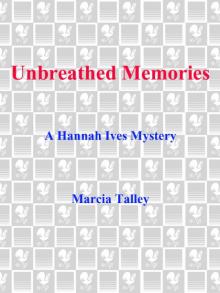 Unbreathed Memories
Unbreathed Memories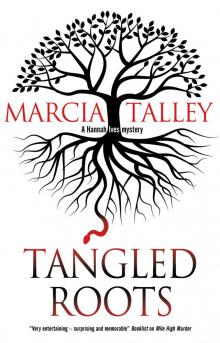 Tangled Roots
Tangled Roots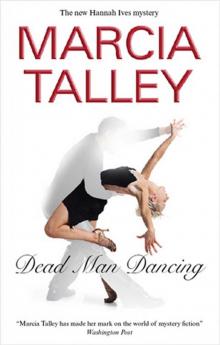 Dead Man Dancing
Dead Man Dancing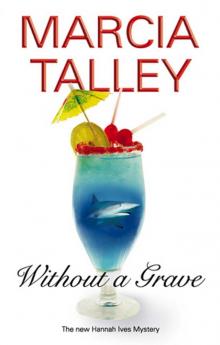 Without a Grave
Without a Grave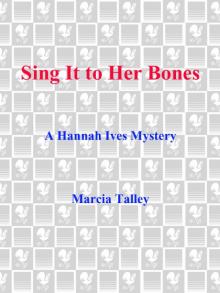 Sing It to Her Bones
Sing It to Her Bones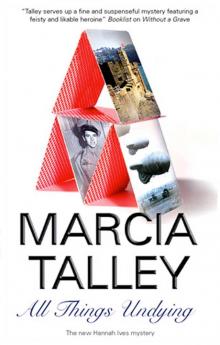 All Things Undying
All Things Undying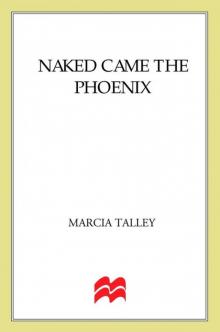 Naked Came the Phoenix
Naked Came the Phoenix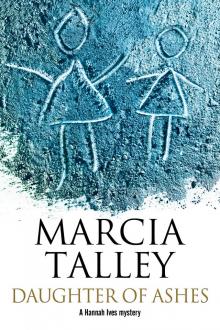 Daughter of Ashes
Daughter of Ashes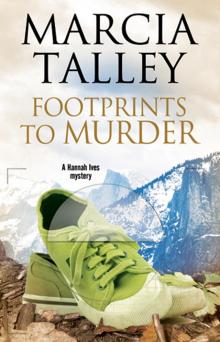 Footprints to Murder
Footprints to Murder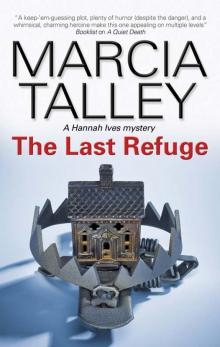 The Last Refuge
The Last Refuge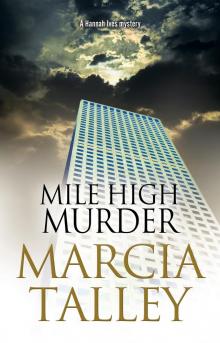 Mile High Murder
Mile High Murder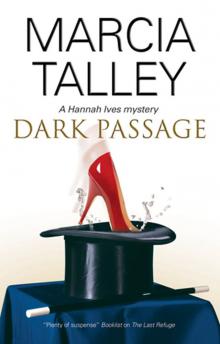 Dark Passage
Dark Passage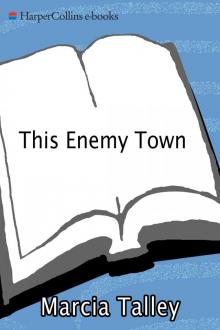 This Enemy Town
This Enemy Town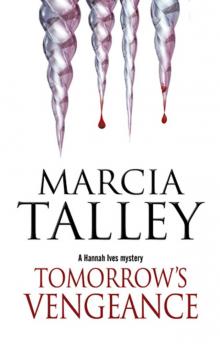 Tomorrow's Vengeance
Tomorrow's Vengeance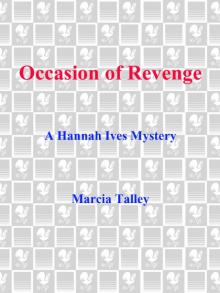 Occasion of Revenge
Occasion of Revenge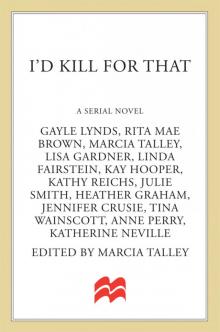 I'd Kill For That
I'd Kill For That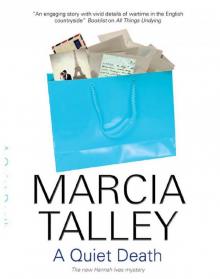 A Quiet Death
A Quiet Death